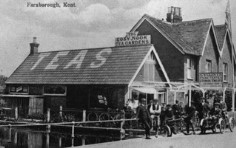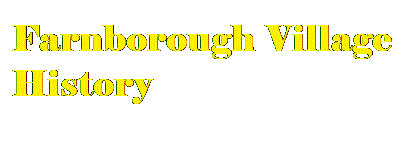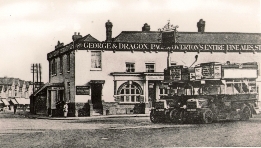


12. SHIRLEY'S WAR
Wartime memories of Farnborough Kent children
by Anne Thorpe (born Shirley Anne Woods 1933) - December 2004
|
I was the youngest of eight children and was six at
the end of June 1939 and we lived at Locksbottom. I remember being in
the garden on the Sunday that war was announced and listening to my
siblings talking about it. The siren wailed and my tummy turned over, as
it still does to this day. Nothing happened and it was all a bit of an
anticlimax. As the war progressed I had two brothers in the army, one
an R.A.F. pilot, a sister in the WAAF, a nursing sister and my eldest
sister, nearly twenty years older than I, was a teacher She was
evacuated on two occasions with her pupils. There were obviously long periods of calm and we walked to school as usual. A shortcut through Mr.Lawrence’s nursery next door, up Tugmutton (I see on the map it is called Broadstreet Green –never heard of it!) past the gypsy winter encampment, a bit scary, sometimes met Neil Purton outside his house and then on to school along Starts Hill Road or into Basetts Way to call for Rosslyn and Jo. More than half a mile so quite a way for little legs four times a day. An early memory of school is being in the big hall of the infants school for assembly on Remembrance Day and the long, long silence. Once in the juniors there was the taking of National Savings on a Monday, friends coming to tea and then we would pick rosehips at the end of Farnborough Park where they grew in abundance then taking them to school to be collected for the making of rosehip syrup for babies. One great bit of war effort the school made was the collection of aluminium pans to make into aeroplanes. We went in procession with our spoils to the hut in the orchard along the Arterial road to hand them in and I seem to remember we got a letter thanking us. There was an air raid shelter under the middle playground and it must have been later in the war when we were all shepherded into the shelter and sat and sat but nothing happened! Another anti-climax! I can’t remember not going to school because of the war, not even when we were at the grammar school. My mother did send my brother and me to an aunt in Somerset for a bit during the ‘40/41 bombing but I don’t think that we stayed for a long time. We hated it. We suffered in silence from a bullying older cousin. One lunchtime at home a plane flew over the hedge so close that for a moment I thought it was one of our planes from Biggin Hill and waved. I then saw the crosses on the side and wings and was horrified. It then zoomed on and apparently machine-gunned children in a school playground before it crashed, a bit of reverse philosophy of “the only good Germans are dead ones” I suppose. There must have been these calm periods because we ranged the neighbourhood. Climbing over the fence to pick primroses at the reservoir and wandering amongst the kingcups in the wood behind Crofton Church. Quite a fair distances for young children, for Rosslyn and Jo to come to Crofton woods and me to go to the reservoir. More freedom, even in wartime than it appears that present day children enjoy. During quiet times my teacher sister who was determined that Keith and I would be educated if she died in the attempt, would take us up to London to see small art galleries and exhibitions. Why an exhibition about the nutritional values of potatoes should stick in my mind but Potato Pete lives on to this day! She also took us to Myra Hess’ recitals in the National Gallery and it seemed spooky in the huge boarded up place. I remember Eros all boarded up but I can’t remember if Nelson’s lions were caged. The bombing of 40/41seemed only to take place at night though I do remember standing at the kitchen door, presumably during the summer of 1940, watching a dogfight. I suppose with planes from Biggin Hill, it was only five miles way. Another daytime raid that comes to mind was when a bomb fell in the field between us and Farnborough Hospital, All the glass in Mr.Lawrences greenhouse smashed and it tinkled away for ages. My sister was nursing at the hospital at the time and she came flying down on somebody’s bike to see if we were alright. We were! In the morning we would go out and pick up the shrapnel. One night my mother took us up to the attic to look east to see the huge glow and even sudden flares which was the London docks burning She said we ought to see what awful things man could do his fellow men and remember. |
We finally got an indoor shelter, a Morrison later in the war. It took
up a great deal of room in the back kitchen. During the early night
raids we two youngest were bedded down under the stairs along with the
dog who didn’t like loud bangs anyway and at the first bang shot into
the cupboard. My sister made us siren suits to wear over our pyjamas and
Keith was only reconciled to his after being told that Churchill had one
too! The flying bombs came near the end of the war and they were
frightening. At night you listened to hear if it stopped before it got
to you, when it didn’t you felt relieved and sad for someone else. The
V2,s were less frightening because you didn’t hear them coming but I was
once out in the garden and heard this swish and looked up and saw the
huge thing. Farnborough Hospital had many hutted wards and many injured
service men were treated there. The convalescent ones would be about
Locksbottom in their bright blue suits and red ties. We children
realized that they were lonely and bored and were quite happy for them
to talk to us and play with us, as were our parents. No “don’t talk to
strangers” then. My nursing sister brought home numerous colleagues and
we seemed to have extra sisters about the place whether Sylvia was there
or not. Our other visitors who needed home comforts were the Canadian
soldiers who I think were based in Holwood Park. Just why they were
there we never knew, perhaps they guarded Biggin Hill. Presumably they
first came with Sylvia and the other nurses but they were all welcome
and now I wonder how my mother fed them all, including the nurses, but
she did. I think the soldiers sometimes brought us goodies from Canada.
I never remember going hungry. Our garden was very productive with fruit
and vegetables. We also kept rabbits for eating and we also made several
attempts at curing the skins with varying success. There was one pair of
rabbit skin mitts though that used to make my hands roast! My mother was
a very good cook and we enjoyed whale meat when it came on to the
market, I’ve heard it said that it tasted fishy but I don’t think ours
did. We hotfooted it to Mr Coates the greengrocer when we heard that he
had oranges in. I know Miss Rowe the infants Headteacher once gave us
some strange sweet brown sort of dried things, which she said were dried
bananas. I don’t think bananas ever appeared in the shop and I think my
nurse sister told me that any bananas that did come into the country
were kept for sick children. The biggest excitement was when word went
round the village that Mr. Sansom had got sweets in. We were off fast to
use our coupons. Visiting a friend of my mother’s with babies was a big
treat. They drank orange juice that was all thick and sticky. All my sisters were talented needlewomen. My mother cheerfully admitted that she wasn’t in their league but we all (including me) knitted and sewed constantly in the evenings. The big sisters pounced on parachute silk and didn’t care if their silk underwear was a strange colour; I remember some was petrol blue. There was also a piece of soft green silk of a curious loose weave and was of a much heavier weight than the ordinary silk. It had quite thick silk cords too and my brother had some for a dressing gown cord. I was told it was a landmine parachute. How we came by these things I have no idea. The heavy silk stayed in the cupboard for ages as no one could think of a use for. Finally the dog tore a hole in a cushion cover and my mother made new cushion covers from it and they lasted for years. Two things later in the war, one was watching huge squadrons of bombers flying over on their way to Germany, the other was long army convoys through the village so continuous that it was nearly impossible to cross the road. Perhaps this was the build-up to D-Day. I don’t think I had a deprived childhood because of the war and I do think that living where we all did, so close to Biggin Hill and in Bomb Alley we were remarkably lucky to have survived so well. |
Next Chapter Back to Introduction